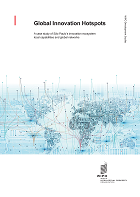Global Innovation Hotspots: A case study of São Paulo’s innovation ecosystem local capabilities and global networks
WIPO Development Studies
Author: Ernest Miguelez
Author: Julio Raffo
Author: Massimiliano Coda-Zabetta
Author: Renato García
Author: Veneziano Araujo
Publication year: 2022
DOI: English

This report presents an in-depth study of the innovation ecosystem of São Paulo (Brazil). We use georeferenced patent, scientific publication, and economic data to characterize one of the few global innovation hotspots in Latin America and the southern hemisphere. It attempts to understand what makes São Paulo different from the rest of Brazil and the Latin American region by mapping what its main potentialities and drawbacks are. The report finds that São Paulo is rich in scientific activity, but lags behind with respect to patent production. At the same time, it is a patent leader in Brazil and the region with characteristics resembling the large innovation hotspots of the world. The report also shows where São Paulo is in the global knowledge space, and how it can leverage scientific production and global networks to upgrade into more complex technological activities. The report also reviews the main innovation policies at national and subnational level, which may partially explain the São Paulo’s success story.
